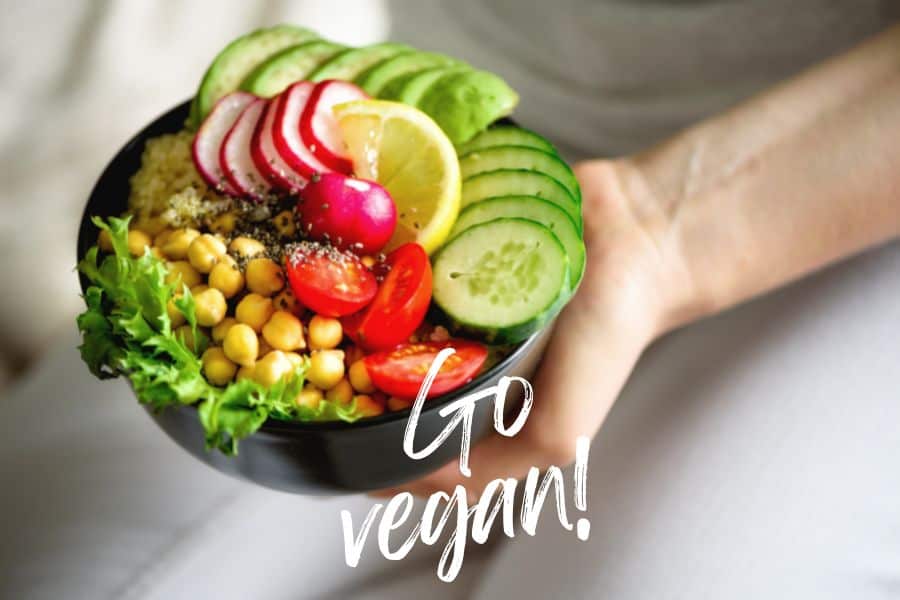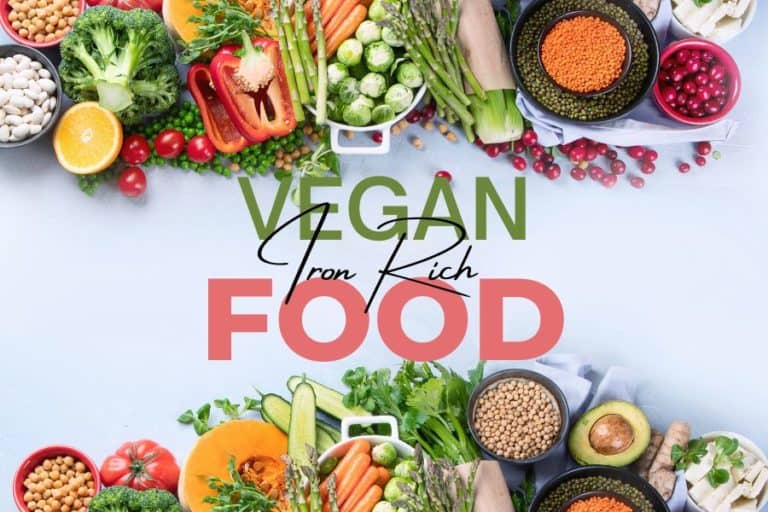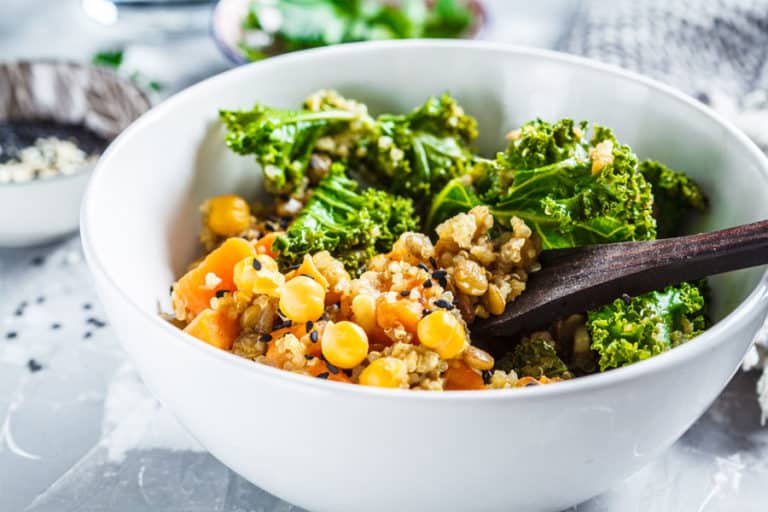Why Go Vegan? Reasons, Benefits, And Tips For Turning Vegan

Reasons | Vegetarian isn’t enough | How to go vegan | Nutritional doubts answered
Veganism is becoming an increasingly popular lifestyle choice. There are many reasons why people choose this lifestyle.
Some opt to go vegan for health reasons, others choose it for ethical reasons, and yet others choose it for the environmental benefits of veganism.
No matter what your reasons for wanting to go vegan may be, it is important to understand the potential benefits and drawbacks of veganism before making the switch.
Why go vegan? – The rationale behind it
There are several reasons to go vegan; here are some noteworthy factors that motivate individuals to adopt plant-based diets like veganism:
1. Health benefits
There are multiple health benefits associated with a vegan diet. A vegan diet has been shown to lower blood pressure, significantly lowering hypertension.
According to another study, [1]National Library of Medicine: Effects of Plant-Based Diets on Weight Status: A Systematic Review a plant-based diet reduces the risk of heart disease, rheumatoid arthritis, type 2 diabetes, and obesity.
The Academy of Nutrition and Dietetics [2]PubMed: Position of the Academy of Nutrition and Dietetics: Vegetarian Diets claims that well-planned vegan and vegetarian diets are healthy, provide adequate nutrition, and may have benefits for preventing or treating certain illnesses.
In contrast, most animal-based foods are high in saturated fats. Thus, a habitual omnivore diet can lead to high cholesterol, obesity, cancer, and the risk of CVD. [3]PubMed: Fatty acid composition of habitual omnivore and vegetarian diets
2. Environmental benefits
A vegan diet can also help to reduce your carbon footprint and save valuable resources such as water and land. Non-vegan lifestyles are sustained by industries that cause the following ecological problems:
Greenhouse gas emissions: Animal agriculture is the second leading cause (first being human-induced) of greenhouse gas emissions. A study [4]SpringerLink: Dietary greenhouse gas emissions of meat-eaters, fish-eaters, vegetarians and vegans in the UK shows that dietary greenhouse gas emissions among meat-eaters was twice as high as those in vegans.
Beef commodities contribute 41% of GHG emissions, cattle milk 20%, Pork 9%, and the egg industry 8% of the global emissions.
Water usage: Animal agriculture is responsible for the consumption of massive amounts of freshwater. Animal agriculture in the United States uses 36 to 74 trillion gallons of water annually. It takes more than 2,400 gallons of water to produce one pound of beef. However, plant foods like tofu take only 244 gallons.
According to the Environmental Protection Agency, about 68% [5]PHYS: Commentary: Animal agriculture’s ‘water footprint’ is putting the planet in peril of lakes, reservoirs, and ponds in the U.S. are too polluted for use due to farming animals- this affects more than half of America’s rivers and streams as well.
Deforestation: Moreover, animal agriculture is also a leading cause of deforestation. Cattle ranching has been associated with 80% of deforestation in the Brazilian Amazon [6]WWF PANDA: UNSUSTAINABLE CATTLE RANCHING rainforest and a loss of about one-third of biodiversity.
To protect our planet from the negative consequences of climate change, the United Nations (UN) [7]Peta: Fight the Climate Crisis by Going Vegan believes that globally, it is best to switch to a plant-based diet.
3. Animal welfare
Another reason to go vegan is for the welfare of animals and to stop animal exploitation because of animal farming.
- Farm animals raised for food are typically kept in cramped, filthy conditions and are subjected to cruel treatment such as tail docking, debeaking, dehorning, and castration without painkillers.
- Moreover, animals raised for food are typically slaughtered at a young age, often before they have even reached maturity.
- Dairy farms have extreme levels of animal cruelty. Dairy cows are artificially impregnated and kept continuously pregnant so that they can produce milk.
- After every pregnancy, the cows must endure a long period of forced lactation with little to no rest.
- These animals often suffer from extreme exhaustion and mastitis (a painful infection that causes swelling in the mammary gland).
- Selective breeding of farmed animals like chicken for mass production causes several health problems. Chickens are fed till they can not bear their own body weight causing them to break their legs or have cardiac failure.
According to the reports by the non-profit organization Animal Charity Evaluators, [8]Animal Charity Evaluators: THE EFFECTS OF DIET CHOICES “an individual would spare about 105 vertebrates per year on average by adopting a plant-based diet”.
4. Social benefits
Veganism can ensure that the resources guzzled away by the various factory-farmed animal industries are diverted to people who need them. Food grains, water, and other resources can then be equitably distributed. It can potentially alleviate the problem of hunger worldwide.
In Brazil, about 5.6 million acres [9]OIPA International Organization for Animal Protection: Vegan for the environment of land are used to grow soya beans for animals in Europe. This contributes to developing world malnutrition by driving impoverished populations to grow cash crops for animal feed rather than food for themselves.
Several slaughterhouses and factory farms often employ undocumented workers for low-paying jobs. Workers in these places suffer from higher levels of PTSD than those in other industries.
Moreover, they are highly exposed to viruses, bacteria, and other physical dangers.
5. Economic benefits
A vegan diet can also save you money. Meat and dairy products tend to be more expensive than plant-based foods, so you may find that you are able to save money by switching to a vegan diet.
Additionally, a vegan diet can help you to reduce your food waste, as plant-based foods have a longer shelf life than meat and dairy products(unrefrigerated).
A study done by PNAS [10]PNAS: Analysis and valuation of the health and climate change cobenefits of dietary change shows that the worldwide switch to plant-based diets could have an economic impact equivalent to 0.4–13% of global gross domestic product (GDP) in 2050, amounting to 1–31 trillion US dollars.
Why being vegetarian isn’t enough
Veganism requires abstaining from all animal-derived ingredients, such as honey, gelatin, and dairy. Vegans also avoid consuming products tested on animals or involving any form of animal exploitation.
Vegetarianism requires abstaining from meat alone. The absence of rules forbidding the consumption of dairy and other animal-derived products makes vegetarians patrons of dairy, bee-keeping, leather, and other industries that exploit animals.
Additionally, these industries also have a very high carbon footprint. Therefore, vegetarianism is in no way an eco-friendly and sustainable lifestyle.
Vegetarianism is also silent on the animal testing of the products, foods, and medicines they consume. Veganism scores a point over vegetarianism here by being steadfast against all forms of animal cruelty: visible and invisible.
How to go vegan?
Here are some tips to help you transition to veganism:
1. The slow transition
Start by slowly reducing the animal products in your diet. You can start with one vegan meal per day, then increase it over time. Take your time to follow these transitioning ideas:
- Do your research: Learn about vegan nutrition and the many delicious vegan recipes available.
- Start simple: Look for easy and nutritious options like lentils, beans, nuts, tofu, and quinoa.
- Look for replacements: Choose vegan substitutes like almond milk, coconut yogurt, and vegan cheese.
- Seek out a community: Connect with other vegans online or in your local area to get tips and recipes.
- Finding motivation: Remind yourself of the many benefits of switching to a vegan lifestyle.
2. Phased transition
You can also try a phased transition by taking the “veganuary challenge” or committing to “meatless mondays.” These will help you switch to veganism sustainably and at a comfortable pace.
3. The complete transition
In this kind of transition, you must eliminate all animal products from your diet, including dairy and eggs, and any product tested on animals or involving animal exploitation all at once.
This transition can be difficult, but the rewards are worth it. You may find that you have more energy and better overall health when you make this switch.
Answering your nutritional doubts
Vegan diets can be healthy and provide all the nutrients a person needs. However, it is best to understand the nutritional needs and make sure to get enough of the important vitamins and minerals.
It is also important to consult a doctor or nutritionist before making any dietary changes to ensure that you are getting all the important nutrients.
Here are some common nutritional doubts that people often have while transitioning to a vegan diet:
1. Protein
Vegan diets can also be a good source of protein. Vegan protein sources include legumes, nuts, seeds, tofu and tempeh, whole grains, and plant-based milks like almond or oat milk.
2. Iron
Iron is an essential mineral that impacts the functioning of every part of the body. This mineral can be found in many vegan foods, such as spinach, beans, quinoa, and fortified cereal.
3. B12
B12 is essential for maintaining healthy nerve cells and red blood cells. Vitamin B12 is found naturally only in animal products. Therefore, vegans should take a supplement or look for fortified foods like plant-based milk, cereals, and nutritional yeast.
4. Healthy fats
Healthy fats are important for many bodily functions and for the absorption of fat-soluble nutrients in the body. These fats can be found in vegan sources such as avocados, walnuts, olives, chia seeds, and flaxseeds.
5. Calcium
Calcium is essential for strong bones and teeth. Vegan sources of calcium include fortified plant-based milk, tahini, dark leafy greens, almonds, figs, and sesame seeds.
Conclusion
Going vegan can be an extremely rewarding experience. Veganism can help reduce animal suffering towards animals, conserve resources, minimize environmental impact and maximize human health.
Veganism should be strongly considered a viable dietary option. It can be a healthy and sustainable way of eating as long as the individual is mindful of their nutritional needs.
References
| ↑1 | National Library of Medicine: Effects of Plant-Based Diets on Weight Status: A Systematic Review |
|---|---|
| ↑2 | PubMed: Position of the Academy of Nutrition and Dietetics: Vegetarian Diets |
| ↑3 | PubMed: Fatty acid composition of habitual omnivore and vegetarian diets |
| ↑4 | SpringerLink: Dietary greenhouse gas emissions of meat-eaters, fish-eaters, vegetarians and vegans in the UK |
| ↑5 | PHYS: Commentary: Animal agriculture’s ‘water footprint’ is putting the planet in peril |
| ↑6 | WWF PANDA: UNSUSTAINABLE CATTLE RANCHING |
| ↑7 | Peta: Fight the Climate Crisis by Going Vegan |
| ↑8 | Animal Charity Evaluators: THE EFFECTS OF DIET CHOICES |
| ↑9 | OIPA International Organization for Animal Protection: Vegan for the environment |
| ↑10 | PNAS: Analysis and valuation of the health and climate change cobenefits of dietary change |







